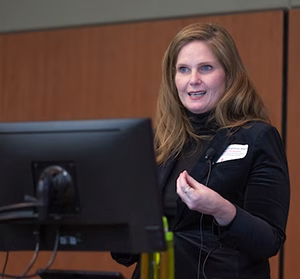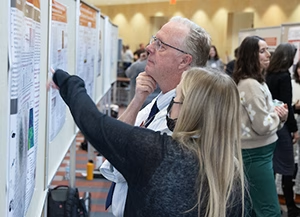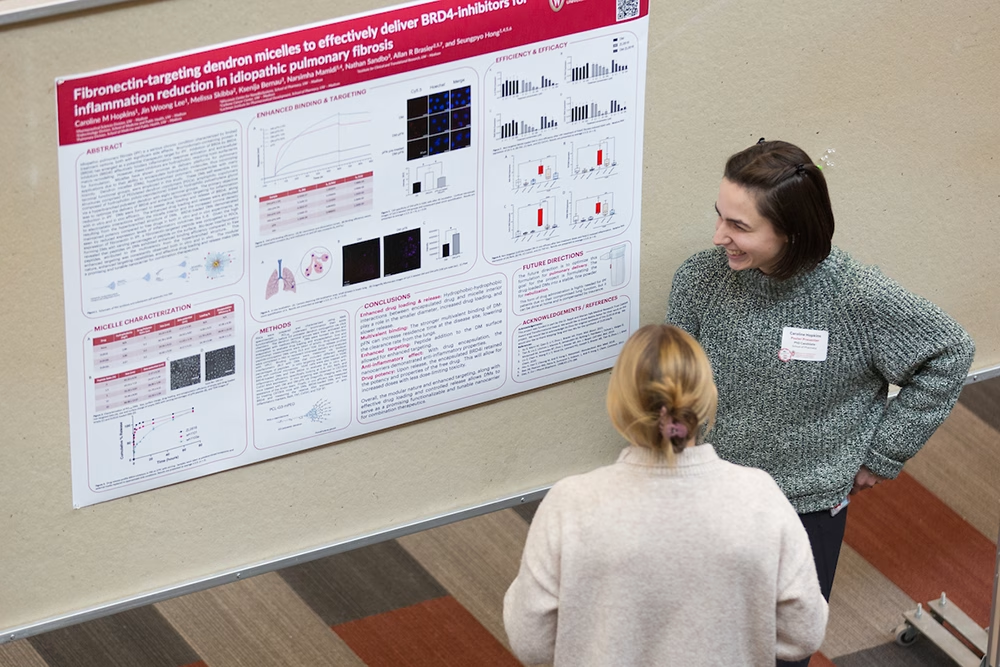While temperatures outside were frigid—hovering barely above zero—the atmosphere inside the Health Sciences Learning Center was warm as the UW Institute for Clinical and Translational Research (ICTR) held its first Institute for Clinical and Translational Research Day on Friday, Jan. 19, 2024.
Under the theme “Accelerate Your Impact,” the event was designed to boost awareness of the many ways that ICTR programs and services help biomedical researchers. ICTR aids them not only with the design and conduct of research (at all project stages), but also through career development programs, skill-building in translational research, and much more.
Roughly 200 attendees registered from all corners of the UW-Madison campus, UW Health and the Marshfield Clinic Research Institute.
“The intention for this day was to foster and accelerate a wide array of research that will make a difference when it reaches a patient or community,” said Dr. Beth Burnside, ICTR’s Co-Executive Director. “Throughout the day, I saw amazing researchers—ranging from early in their careers to very experienced—connecting with ICTR’s large collection of dedicated individuals who are enthusiastic about partnering with them.”
Burnside added that ICTR hopes to make this an annual event in order to “keep building and reinforcing interdisciplinary relationships, as well as partnerships with ICTR, that will speed the impact of translational research.”

NIH Associate Director for Science Policy Dr. Lyric Jorgenson delivered the day’s keynote
The Associate Director for Science Policy at the National Institutes of Health (NIH), Dr. Lyric Jorgenson, delivered the keynote, “Promoting Effective Translational and Clinical Research through Policy.” Jorgenson is also the Director of the Office of Science Policy at the NIH.
Dr. Jorgenson explored what it means to look at biomedical research through the lens of policy; a key element, she said, is ensuring that research gets to the people who need it. She noted that the NIH’s new director, Dr. Monica Bertagnolli, who began her tenure in Nov. 2023, is prioritizing making clinical research more inclusive and accessible to people, as well as seeking to rebuild public trust in science. Jorgenson also emphasized the importance of bioethics in guiding all that the NIH does.
Other sessions during the day included a poster session in the building’s Atrium; lightning talks; and panels on building high-impact translational teams, ICTR’s Protocol Development Program, UW’s Learning Health System, and cross-institutional and multi-site studies. The day concluded with awards given to poster presenters in three categories: graduate students, postdocs, and research staff.
During a morning session on high-impact teams, attendees learned how ICTR’s Team Science program can help researchers build strong, productive teams through a 90-minute offering on Collaboration Planning. This intervention gives teams a chance to discuss and co-create a shared culture, vision, anticipated outputs, clear roles and responsibilities for members, and more.
“It’s never too early to think about Collaboration Planning,” said ICTR Executive Director Dr. Allan Brasier in response to an audience question.

A poster presenter discusses her research with ICTR Executive Director Dr. Allan Brasier in the HSLC Atrium
“It helps to build a solid foundation for high-performance translational team performance,” he noted. “The sooner you can do it, the better.”
If you’d like to request a consultation with an ICTR program or service, please visit the Consult Request Page on the ICTR website or reach out to the Clinical Trials Navigator, Dr. Leigh Ann Mrotek. General questions about ICTR can be sent to info@ictr.wisc.edu.
